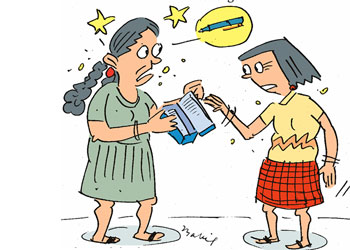|

by R. S. Karunaratne
Active and passive voice
[Part 1]
Compare the following sentences:
1. Gunadasa helps Ponniah.
2. Ponniah is helped by Gunadasa.
|

Hemal is distributing biscuits to his friends. |
Both these sentences express the same meaning. But in sentence 1, the
form of the verb (helps) shows that the person denoted by the subject (Gunadasa)
does something. Therefore, the verb ‘helps’ is in the active voice.
In sentence 2, the form of the verb (is helped) shows that something
is done to the person denoted by the subject. Therefore, the verb ‘is
helped’ is in the passive voice.
The active voice is used when the agent (the doer of the action) is
to be made prominent. The passive voice is used when the person or thing
acted upon is to be made prominent.
The passive voice is preferred when the active form would involve the
use of an indefinite or vague pronoun (somebody, they, people, we etc)
as the subject.
‘My pen has been stolen.’ This is better than saying “Somebody has
stolen my pen.’
Other examples:
English is spoken all over the world.
I have been invited to the party.
All orders will be executed promptly.
A passive sentence begins with the person or thing that receives the
action. Then the verb is in the passive voice.
The house was built by George.
Note: The ‘object’ of an active sentence becomes the ‘subject’ of a
passive sentence.
When we change a sentence from the active voice to the passive voice,
the tense of the verb remains the same.
Active voice: Mother sends us to school.
|

‘My pen has been stolen.’ |
Passive voice: We are sent to school by mother.
When we change a sentence from the active voice to the passive voice,
the verb should agree with the subject in number.
Active voice: Hemal is distributing biscuits to his friends.
Passive voice: Biscuits are being distributed to his friends by Hemal.
[Activity]
Turn the following active voice sentences to the passive voice.
1. Rama loved Sita.
............................................................................
2. Ponniah is building a parapet wall.
............................................................................
3. The security guard opened the gate.
............................................................................
4. Boy Scouts are helping a wounded man.
............................................................................
5. Bhadra will finish the course in three years.
............................................................................
6. Who did this?
............................................................................
7. Why did she write such a letter?
............................................................................
8. Someone has invited me to the party.
............................................................................
9. We will execute all orders promptly.
............................................................................
10. People speak English all over the world.
............................................................................
************
[Key]
1. Sita was loved by Rama.
2. A parapet wall is being built by Ponniah.
3. The gate was opened by the security guard.
4. A wounded man is being helped by Boy Scouts.
5. The course will be finished by Bhadra in three years.
6. By whom was this done?
7. Why was such a letter written by her?
8. I have been invited to the party.
9. All orders will be executed promptly.
10 English is spoken all over the world.
************
Current English usage
English is a living language that keeps on changing from time to
time.
Those who learn English should keep in touch with the new
developments and changes in the language. Here’s a guide to the latest
trends in English.
1. Attendee / attender / attendant
‘Attendee’ is ‘someone who goes to a place or event.’ ‘Attender’ has
the same meaning but most speakers prefer ‘attendee’. ‘Attendant’ is
‘someone whose job is to be in a place and help visitors or customers.’
We find attendants in hospitals. They help patients.
2. Authoress / poetess
These are needless feminine forms that have acquired slightly
disparaging connotations.
3. Avail
All my efforts to become a lawyer were of no avail is idiomatically
correct. However, ‘avail’ cannot be used in the passive voice. ‘The
opportunity was not availed of” is incorrect.
4. Averse is always followed by the preposition ‘to’ and a gerund. He
is averse to gambling.
5. Awful
‘Awful’ means ‘full of awe’. For instance, we hear of God’s ‘awful
purity’. However, in current English ‘awful’ means ‘nice, terrible’, or
‘frightful.’ The driver suffered awful injuries in the crash. These days
we have awful weather. We have an awful colleague in our workplace.
6. Awhile / A while
‘Awhile’ means ‘for a short period.’ Let’s rest awhile. However,
after a preposition we use ‘a while.’ After a while the engine started.
7. Bacterium / bacteria
‘Bacterium’ is a type of very small organism that lives almost
everywhere. ‘Bacteria’ is the plural form. His illness was caused by
bacteria in drinking water.
8. Bid / bade
‘Bid’ means ‘to offer a particular amount of money for something
which is for sale.’ ‘Bade’ is the simple past tense of ‘bid.’ ‘Bade’ is
pronounced ‘bad’, not ‘baid.’
9. Bailout / bail out
In American English ‘bailout’ means ‘helping somebody or organisation
by giving them money to come out of a difficult situation.’ In British
English we use ‘bale out.’
10. Baleful / baneful
‘Baleful’ means ‘threatening.’ He gave the child a baleful look.
‘Baneful’ means harmful.
11. Balmy / barmy
‘Balmy’ means ‘pleasantly warm.’ We enjoyed the balmy weather in
summer. ‘Barmy’ means ‘very silly.’ I don’t agree with your barmy ideas.
12. Bar is a preposition meaning ‘except.’ Refugees were leaving the
village bar the very old. “It’s all over bar the shouting” is an
idiomatic expression.
13. Barbarism / barbarity
‘Barbarism’ means ‘extreme cruelty.’ We speak of acts of barbarism
during the war. ‘Barbarity’ means ‘behaviour that is very cruel.’ This
barbarity must stop!
14. Beg means ‘to make a very strong and urgent request.’ She begged
for money. However, “I beg to inform you” or “I beg to state...” are no
longer used in standard English.
15. Begin / commence
Wherever possible, use ‘begin.’ ‘Commence’ is a formal word used for
the announcements of meetings and concerts.
‘Go’ has many uses
In speech and writing, we use ‘go’ for various purposes. We use ‘go
to’ followed by a place or destination.
We are going to Bangalore next week.
I usually go to work at 8 a.m.
What time do you go to work?
Lakshitha doesn’t want to go to his friend’s birthday party.
I want to go to the concert.
Shashini went to the dentist on Sunday.
I go to bed at 11 p.m.
What time are you going home? (without ‘to’)
Go on
|

We’re going shopping, will you join us? |
We go on holiday to Nuwara Eliya every year.
When we were on holiday we visited many important places in Matara.
Schoolchildren very often go on trips during holidays.
Go for
The weather is nice. Let’s go for a walk.
Yesterday we wanted to go out for a meal but the restaurant was closed.
A: Where’s Padma?
B: She’s gone for a walk.
We are going to Japan for a holiday.
Note the difference between ‘on holiday’ and ‘for a holiday.’
Go + continuous verb
When do you go shopping for New Year?
Nethmi is going swimming.
The village elders went fishing.
The fishermen have gone sailing.
Those who live near the mountains often go skiing.
If you have a boat, you can go sailing.
We’re going shopping, will you join us?
It’s a holiday. Let’s go swimming.
[Activity]
Fill in the blanks with ‘to, on’, or ‘for’ where necessary. Check
your answers with the key.
1. We’re going ........ Italy next week.
2. Roy has a boat, so he often goes .......... sailing.
3. Abdul went ...... South Africa last month.
4. Would you like to go .......... the theatre this evening?
5. They go ............ jogging every morning.
6. We’re going out .............. a walk, will you join us?
7. Last night I went ........ a party.
8. I went ......... bed very late last night.
9. Lal is going .......... holiday ........... China next month.
10. Shall we go ........ a swim?
[Key]
1. to 2. — (No preposition) 3. to 4. to 5. — 6. for 7. to 8. to 9.
on, to 10. for
Matching game
Match the words in column ‘A’ with the correct definitions in column
‘B’ by writing the letter in the space provided. Check your answers with
the key.
[Column A]
..... 1. Babble
..... 2. Bachelor
..... 3. Backbite
..... 4. Backfire
..... 5. Backing
..... 6. Backlog
..... 7. Backstage
..... 8. Backup
..... 9. Bacteriology
..... 10. Baffle
..... 11. Baggy
..... 12. Balderdash
..... 13. Balk
..... 14. Ballad
..... 15. Ballerina
..... 16. Ballyhoo
..... 17. Balmy
..... 18. Bamboozle
..... 19. Banal
..... 20. Bandit
[Column B ]
A. to speak unkindly about somebody who is absent
B. a pile of uncompleted work
C. a female ballet-dancer
D. warm and soft
E. an unmarried man
F. cheat
G. behind a theatre stage
H. an armed robber
I. to go wrong
J. to confuse
K. nonsense
L. to hesitate
M. hanging loose
N. poem which tells a popular story
O. a noisy and confused situation
P. lacking in interest or originality
Q. support
R. the scientific study of bacteria
S. support
T. to say something quickly
Key:
1. T 2. E 3. A 4. I 5. S 6. B 7. G 8. Q 9. R 10. J 11. M 12. K 13. L
14. N 15. C 16. O 17. D 18. F 19. P 20. H
Play with vowels
Most verbs have vowels. In the following words some vowels are
missing. Fill the blanks with vowels (a, e, i, o, u) and check your
answers with the key.
1. B...ng : a sudden loud explosive noise
2. Ban...sh : to send somebody away from a place
3. Bankr...ll : financial resources
4. Banqu...t : a sumptuous formal dinner
5. B...nter : light-hearted friendly talk
6. B...rb : a humorous but hurtful remark
7. Barbar...an : an uncivilised person
8. B...rd : a poet
9. B...re : not covered by clothes
10. Barga...n : something offered for sale
11. Barg... : a large boat
12. B...rmy : crazy
13. Barr...n : not producing results
14. Barr...cade : a barrier
15. B...rter : trade by exchanging goods
16. B...sement : the lowest floor of a building
17. Bashf...l : shy
18. Baz...ar : a market place
19. B...ady : small, round and bright
20. Bedev...l : to cause continued difficulties
Key:
1. a 2. i 3. o 4. e 5. a 6. a 7. i 8. a 9. a 10. i 11. e 12. a 13. e
14. i 15. a 16. a 17. u 18. a 19. e 20. i |

